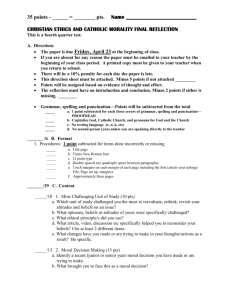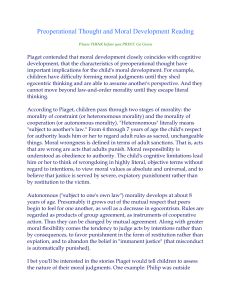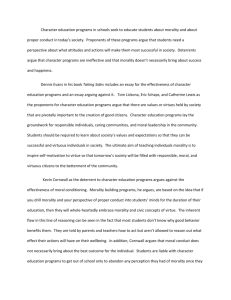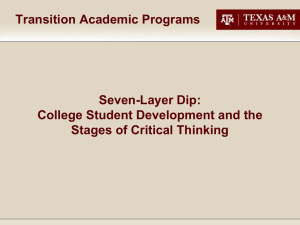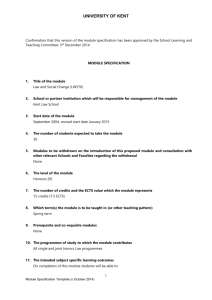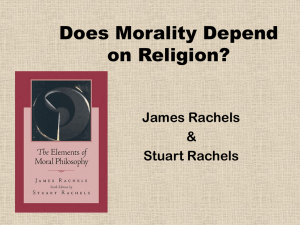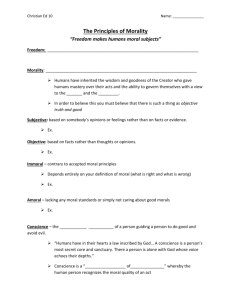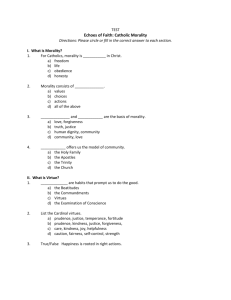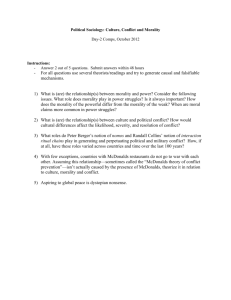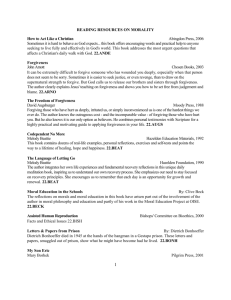Roman Catholic Christian Morality Course further challenges
advertisement
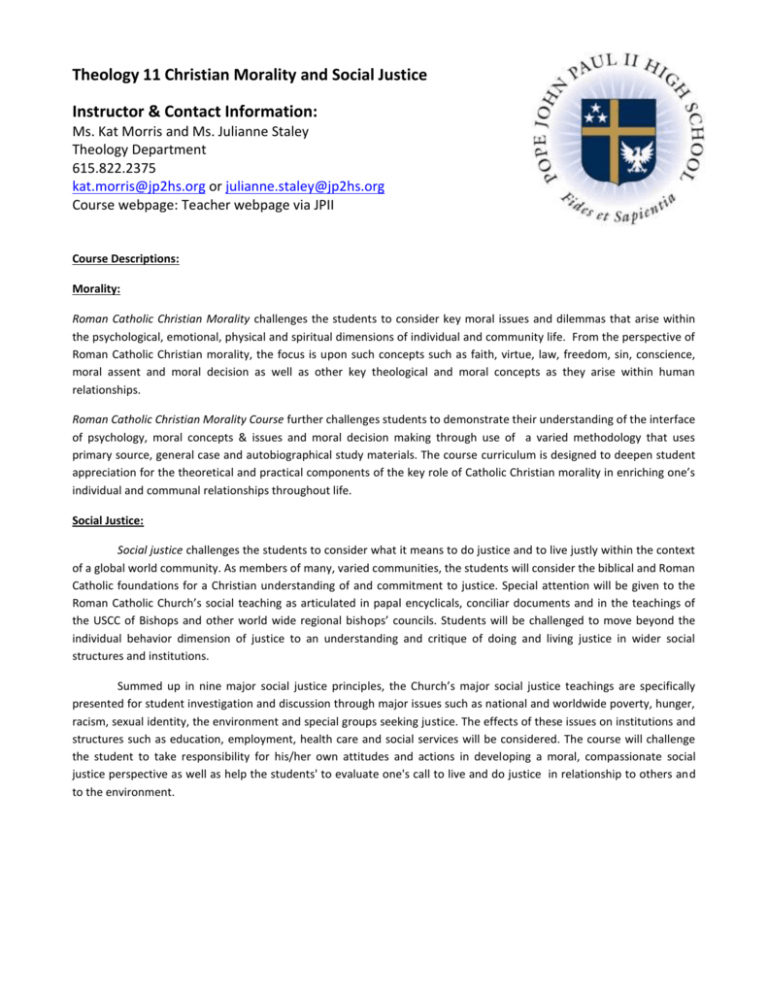
Theology 11 Christian Morality and Social Justice Instructor & Contact Information: Ms. Kat Morris and Ms. Julianne Staley Theology Department 615.822.2375 kat.morris@jp2hs.org or julianne.staley@jp2hs.org Course webpage: Teacher webpage via JPII Course Descriptions: Morality: Roman Catholic Christian Morality challenges the students to consider key moral issues and dilemmas that arise within the psychological, emotional, physical and spiritual dimensions of individual and community life. From the perspective of Roman Catholic Christian morality, the focus is upon such concepts such as faith, virtue, law, freedom, sin, conscience, moral assent and moral decision as well as other key theological and moral concepts as they arise within human relationships. Roman Catholic Christian Morality Course further challenges students to demonstrate their understanding of the interface of psychology, moral concepts & issues and moral decision making through use of a varied methodology that uses primary source, general case and autobiographical study materials. The course curriculum is designed to deepen student appreciation for the theoretical and practical components of the key role of Catholic Christian morality in enriching one’s individual and communal relationships throughout life. Social Justice: Social justice challenges the students to consider what it means to do justice and to live justly within the context of a global world community. As members of many, varied communities, the students will consider the biblical and Roman Catholic foundations for a Christian understanding of and commitment to justice. Special attention will be given to the Roman Catholic Church’s social teaching as articulated in papal encyclicals, conciliar documents and in the teachings of the USCC of Bishops and other world wide regional bishops’ councils. Students will be challenged to move beyond the individual behavior dimension of justice to an understanding and critique of doing and living justice in wider social structures and institutions. Summed up in nine major social justice principles, the Church’s major social justice teachings are specifically presented for student investigation and discussion through major issues such as national and worldwide poverty, hunger, racism, sexual identity, the environment and special groups seeking justice. The effects of these issues on institutions and structures such as education, employment, health care and social services will be considered. The course will challenge the student to take responsibility for his/her own attitudes and actions in developing a moral, compassionate social justice perspective as well as help the students' to evaluate one's call to live and do justice in relationship to others and to the environment. Major Course Units: Semester 1: Morality Themes Dates Introduction to Catholic Morality 4 weeks Ethics, Virtue/Happiness Nature, Development and Role of Conscience 4 weeks Core Elements of the Moral Act, Evil Moral Decision Making Method Law, Responsibility, Freedom in Morality 4 weeks What is justice? Types of Justice 3 weeks Intro Principles of Catholic Social Teaching Discrimination 2 weeks Semester 2: Social Justice Themes Dates Poverty (International/Domestic) 4 weeks Racism 3 Weeks Sexism and Heterosexism 3 weeks Sexual Morality Dignity of Life 5 Weeks Death Penalty, War Beginning and End of Life Issues Section 7: Environmental Justice 2 weeks Assessment Types and Forms for Theology 11: Christian Morality and Social Justice Type Homework Description Daily work designed to help students explore and review concepts while also improving their problemsolving skills. Assessment Form Concept Check Quiz. These quizzes are related to the reading. Case Study Assignments. The students will be asked to read, reflect upon & evaluate a moral dilemma based case study and to answer questions that demand use of pre-discussed concepts and developing decision making skills. Class Case Studies or Unit Assessment Explorations of concepts. In-class component where students will work individually or in groups to respond to a media moral dilemma, a media summary piece or case study. Responses may be orally with group presentations or in writing with an individual or group written assignment. Unit Tests Multiple-Choice, Matching, True/False, Short Case Response The ability to use knowledge about the content to answer multiplechoice style objective questions is one of the important skills that must be developed in order to be successful in college courses and in other test (SAT, ACT)assessments. “Essay” Test questions are the Home Assigned or In-Class Case Study Questions that allow students time to process, evaluate and write up their responses. The in class final exam will be objective exam style much like section tests except longer. Final exam essays will be like the section text essays done prior to the actual exam. Exams Mid-Term Exam Final Exam In its own category, the exams count 20% of the semester grade each term
